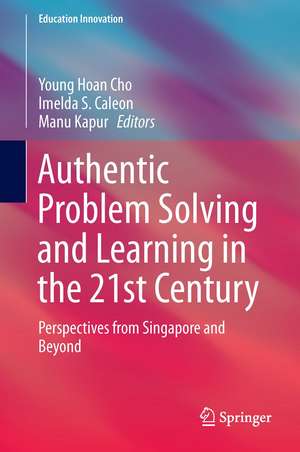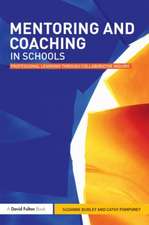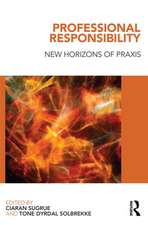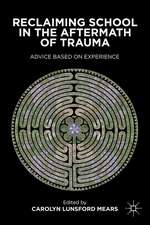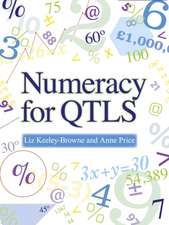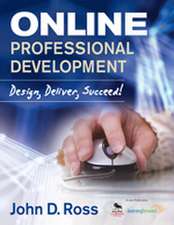Authentic Problem Solving and Learning in the 21st Century: Perspectives from Singapore and Beyond: Education Innovation Series
Editat de Young Hoan Cho, Imelda S. Caleon, Manu Kapuren Limba Engleză Hardback – 21 aug 2015
| Toate formatele și edițiile | Preț | Express |
|---|---|---|
| Paperback (1) | 894.16 lei 6-8 săpt. | |
| Springer Nature Singapore – 23 oct 2016 | 894.16 lei 6-8 săpt. | |
| Hardback (1) | 900.18 lei 6-8 săpt. | |
| Springer Nature Singapore – 21 aug 2015 | 900.18 lei 6-8 săpt. |
Din seria Education Innovation Series
- 24%
 Preț: 742.68 lei
Preț: 742.68 lei - 18%
 Preț: 732.70 lei
Preț: 732.70 lei - 15%
 Preț: 647.08 lei
Preț: 647.08 lei - 15%
 Preț: 644.63 lei
Preț: 644.63 lei - 15%
 Preț: 648.89 lei
Preț: 648.89 lei - 15%
 Preț: 656.58 lei
Preț: 656.58 lei - 15%
 Preț: 648.56 lei
Preț: 648.56 lei - 18%
 Preț: 952.09 lei
Preț: 952.09 lei - 15%
 Preț: 643.34 lei
Preț: 643.34 lei - 20%
 Preț: 571.84 lei
Preț: 571.84 lei - 18%
 Preț: 789.35 lei
Preț: 789.35 lei - 15%
 Preț: 641.03 lei
Preț: 641.03 lei - 18%
 Preț: 948.29 lei
Preț: 948.29 lei - 20%
 Preț: 564.21 lei
Preț: 564.21 lei - 15%
 Preț: 647.59 lei
Preț: 647.59 lei - 18%
 Preț: 1003.70 lei
Preț: 1003.70 lei - 18%
 Preț: 901.74 lei
Preț: 901.74 lei
Preț: 900.18 lei
Preț vechi: 1097.78 lei
-18% Nou
Puncte Express: 1350
Preț estimativ în valută:
172.25€ • 180.30$ • 143.37£
172.25€ • 180.30$ • 143.37£
Carte tipărită la comandă
Livrare economică 31 martie-14 aprilie
Preluare comenzi: 021 569.72.76
Specificații
ISBN-13: 9789812875204
ISBN-10: 9812875204
Pagini: 300
Ilustrații: XI, 368 p. 36 illus., 27 illus. in color.
Dimensiuni: 155 x 235 x 24 mm
Greutate: 0.71 kg
Ediția:1st ed. 2015
Editura: Springer Nature Singapore
Colecția Springer
Seria Education Innovation Series
Locul publicării:Singapore, Singapore
ISBN-10: 9812875204
Pagini: 300
Ilustrații: XI, 368 p. 36 illus., 27 illus. in color.
Dimensiuni: 155 x 235 x 24 mm
Greutate: 0.71 kg
Ediția:1st ed. 2015
Editura: Springer Nature Singapore
Colecția Springer
Seria Education Innovation Series
Locul publicării:Singapore, Singapore
Public țintă
ResearchCuprins
A. Introduction and Overview.- Chapter 1 Authentic Problem Solving and Learning for 21st Century Learners.- B. Authentic Problems and Tasks.- Chapter 2 The Roles of Authentic Tasks in Promoting 21st Century Learning Dispositions.- Chapter 3 A Design Model for Problem-based Learning.- Chapter 4 Mathematical Problem Solving Using Real-World Problems.- C. Problem-Based Learning Environments.- Chapter 5 Problem-based Learning: Conception , Practice, and Future.- Chapter 6 Using Problems to Learn in a Polytechnic Context.- Chapter 7 Pedagogical Interfaces in a Problem-based Learning Environment: Cognitive Functioning at PBL stages.- Chapter 8 Finding Common Ground during Collaborative Problem Solving: Pupils' Engagement in Scenario-based Inquiry.- D. Authentic Practice in School.- Chapter 9 Cultivating a Remix Movement in an East Asian Culture.- Chapter 10 Authentic Thinking with Argumentation: Putting on the Thinking Caps of Scientists and Designers.- Chapter 11 Using an Immersive Environment to Address Problems Associated with the Learning of Geography.- E. Authentic Practice through Productive Failure.- Chapter 12 Learning from Productive Failure.- Chapter 13 Discussing Student Solutions is Germane for Learning when Providing or Delaying Instruction.- Chapter 14 Mathematical Skills and Learning-By-Invention in Small Group.- F. Authentic Participation in Real-World Communities.- Chapter 15. The Retail Experience for Active Learning (REAL) Experience.- Chapter 16 Authentic Learning Experiences in Informal Science Learning: A Case Study of Singapore's Prospective Teachers.- Chapter 17 Exploring the Process of Problem Finding in Professional Learning Communities through a Learning Study Approach.- Chapter 18 Problem Solving of Teacher-generated Classroom Management Cases in Wiki-based Environment: An Analysis of Peers' Influences.- G. Conclusions and Future Direction.- Chapter 19 Authentic Problem Solving and Learning: Lessons Learned and Moving Forward.- Chapter 20Authentic Learning Research and Practice: Issues, Challenges, and Future Directions.
Notă biografică
Young Hoan Cho is an assistant professor of Educational Technology in the Department of Education at Seoul National University, South Korea. He earned a PhD in information science and learning technologies from the University of Missouri, USA. He was previously a research scientist at the Office of Education Research, National Institute of Education, Singapore. His research focuses on problem-based learning environments, computer-supported collaborative learning, argumentation, and 3D virtual worlds.
Imelda S. Caleon is Research Scientist at the Centre for research in Pedagogy and Practice, National Institute of Education, Singapore. Her research interests include conceptual change and development, informal learning, inquiry-based learning and creative-collaborative problem solving, particularly in relation to science education.
Manu Kapur is an Associate Professor of Curriculum, Teaching, and Learning, as well as the Head of Research of the Learning Sciences Lab at the National Institute of Education (Singapore). His research examines the role of Productive Failure in learning and problem solving.
Imelda S. Caleon is Research Scientist at the Centre for research in Pedagogy and Practice, National Institute of Education, Singapore. Her research interests include conceptual change and development, informal learning, inquiry-based learning and creative-collaborative problem solving, particularly in relation to science education.
Manu Kapur is an Associate Professor of Curriculum, Teaching, and Learning, as well as the Head of Research of the Learning Sciences Lab at the National Institute of Education (Singapore). His research examines the role of Productive Failure in learning and problem solving.
Textul de pe ultima copertă
With the rapid changes in the social, political, economic and technological landscape around the world, today’s learners face a more globally competitive job market after leaving school. The 21st century, which is characterized by the emergence of knowledge-based societies, expects learners to be comfortable in dealing with ambiguities and complexities in the real world and to be able to use knowledge as a tool at their workplace. This book will help readers develop an in-depth understanding of authentic problem solving and learning, and how it can be used to make a difference in their school or learning communities for the development of 21st century competencies. Comprising 20 chapters written by Singapore-based and international authors, the book is organized into three themes: authentic problems, authentic practices, and authentic participation. It details innovative school practices (e.g. productive failure) concerning the design of problems, learning activities, learning environments, and ICT tools for authentic problem solving and learning. Along with theoretical explanations of authentic learning processes and outcomes, the book also elucidates how students learn by generating and exploring solutions to complex problems and which cognitive functions are needed at different stages of problem-based learning. Presenting coherent descriptions of instructional design principles, successful cases and challenges encountered in K-12 schools and learning communities, the book provides useful information, new insights, and practical guidance for school directors, parents, teachers and researchers seeking to develop authentic learning environments for 21st century learners.
Caracteristici
Introduces authentic problem solving and learning practices for school stakeholders Provides theoretical explanations of authentic learning processes and outcomes Shows how authentic learning can be designed and implemented to help develop 21st century competencies
